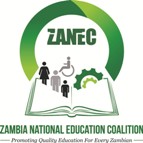
Zambia National Education Coalition (ZANEC) is pleased with the distribution of the funds allocated to the Education and Skills Sector. The allocations generate a new hope for the sector as they exhibit progressive strides towards ensuring quality education for all. This resonates well with the budget theme of “growth, jobs and taking development closer to the people”.
As ZANEC, we are particularly pleased with the decision to recruit a record high number of 30,000 teachers to improve the teacher pupil ratio. This will improve teacher pupil contact time and eventually advance learning outcomes. Our expectation is that these recruitments will be conducted in the first quarter of 2022 to enable timely deployment. We are also looking forward to monitoring the deployment process to ascertain whether these teachers will be deployed where they are required the most. Our hope is that government will remove the constraints posed by the Payroll Management and Establishment Control (PMEC) system in taking teachers where they are required the most. We also hope to see the equitable recruitment and deployment of teachers across Early Childhood Education, primary and secondary education. As we may know ECE sub-sector currently only has 1,952 teachers representing a teacher pupil ratio of 1:86 against the required 1:22 learners.
The abolishment of tuition fees, Parent and Teachers Association (PTA) fees and examination fees at secondary school level is also a step in the right direction as it will significantly reduce the high school drop-out rates that have been recorded in the past as learners transition from primary to secondary school level. This in essence has translated into an extension of free education up to secondary level thereby relieving the parents or guardians of the burden of sourcing money to keep their children in school. However, we look forward to analysing the details in the 2022 Yellow Book to see the actual allocations to schools in form of grants. We are happy that the Minister, in his speech, assured us that the grants to schools would increase three-fold. This will ensure that the abolition of the said fees do not result in unbearable operational costs for the schools which may have the negative effect of compromising the quality of education.
Further, the introduction of a bursary scheme for boarding fees for vulnerable learners at secondary school level will help improve access to education especially for the vulnerable and rural learners. It is heart-warming to note that the communities at grassroot level have been given the mandate to identify and select the vulnerable learners in the Wards through the Constituency Development Fund (CDF). The increase of the CDF from 1.6 million to 25.7 million is highly commendable especially that it operationalises decentralisation. It is more so pleasing that this CDF is directed at communities making decisions on how many schools they want to construct in their communities, among other things. However, there will be need to build the capacity of Ward Development Committees (WDCs) and ensure they operate according to the new guidelines.
The intention to build 120 secondary schools through the concessional loan from the World Bank will ensure that the increased access to education as a result of making secondary education free will not be negated by limited classroom space. We hope to see an even distribution of these schools across all provinces in order to ensure equal access to all. Further, the allocation of the K694.3 million for construction and completion of ongoing school infrastructure development is most welcome to further reduce the classroom: pupil ratio. Similarly, the increase in girls accessing bursaries from 28, 000 to 43,000 is progressive. But government needs to ensure that the deserving girls benefit from this facility. This is because in the 2020 Auditor General’s Report, it was reported that government only captured 13,000 girls out of the targeted 28,000 girls and that there were a lot of ‘ghost’ girls in the system.
Finally, ZANEC would like to express its disappointment with the reduced share of the education sector budget from 11.5% in 2021 to 10.46% in 2022. This is because government has allocated 18.1billion kwacha out of the 173 billion national budget. This is contrary to expectations raised over the past two months that the country will comply with the international and regional commitments that the country has assigned to. It is our hope that, as this is the first budget of the new government, the share of the education budget will gradually grow to the regional recommended minimum of 20% in the Cairo and SADC Protocol. Nevertheless, we look forward to timely disbursements and implementation of the measures detailed in the budget as we are sure that achieving these targets will definitely improve both access and quality of education.
For/ZANEC
George Hamusunga
Executive Director
Find Us on Social Media